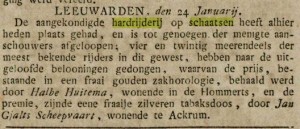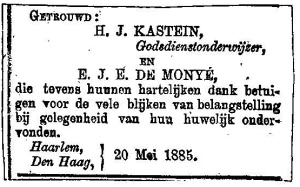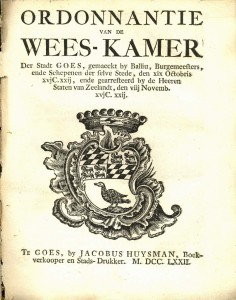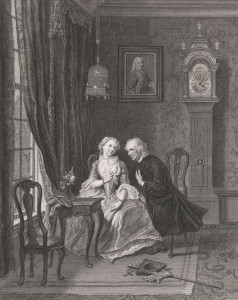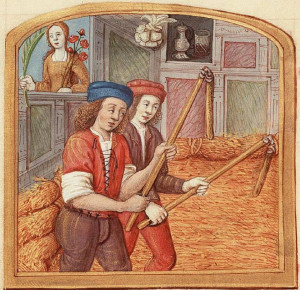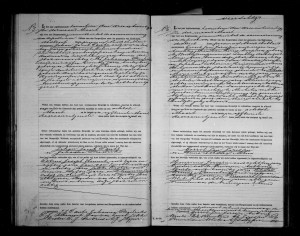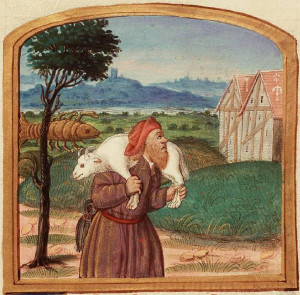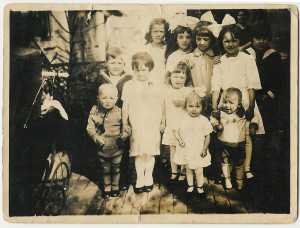A krant (plural: kranten) is a newspaper. The first newspaper in the Dutch language was the Courante uyt Italien, Duytslandt, &c. that first appeared in 1618. The oldest newspaper that still exists is the Leeuwarder Courant, that has appeared since 1752. The Royal Library of the Netherlands is digitizing old newspapers and making them available for free at Delpher.nl. Click the tab kranten to search the newspapers. The website is only available in Dutch. Search for names of ancestors … [Read more...]
Source: Family announcements
In the Netherlands, there has never been a tradition of writing biographical obituaries like you see in countries like the United States. Instead, "familieberichten" [family announcements] simply announce the death of a person. In the 19th century, only more affluent people had a familiebericht placed in the paper. It was usually very short and only signed by the closest relative, typically the spouse or eldest son. In the 20th century, the announcements became a bit more informative and … [Read more...]
Dutch term – Weeskamer
A weeskamer is the orphan chamber, a government body responsible for overseeing the administration of the estates of (half) orphans. Weeskamers should not be confused with orphanages: they did not take care of the orphans, just the administration of the estates. Weeskamers existed in most parts of the Netherlands until 1810. After 1810, their tasks were taken over by the court. They also existed in Dutch colonies, like New Amsterdam (present-day New York). Tasks of the orphan chamber After a … [Read more...]
Dutch term – Bruid
A bruid is a bride. Most women married for the first time in their mid to late twenties. If you see a woman who got married before the age of twenty, you will often find one of these circumstances to be the case: The bride is pregnant The bride is an orphan The groom is a widower with young children and the bride is his former maid. Of course, there could be several other reasons why people married young, but in my experience one of these three situations usually applies. … [Read more...]
Dutch term – Oogstmaand
Oogstmaand literally means "harvest month" and is the old word for August. … [Read more...]
Dutch term – Trekschuit
Trekschuit literally means "pull barge" and is a low-bottomed ship that was dragged along canals and rivers. In the waterlogged country that is The Netherlands, trekschuiten were one of the main forms of transportation for people and goods over longer distances, as roads were often so muddy that they were useless for most of the year. Most trekschuiten were powered by horses, who walked along the rivers and canals on specially created paths. In some cases, the people who operated the … [Read more...]
Dutch term – Toegang
The Dutch word toegang literally means "access" or "entrance." In archival jargon, it means a finding aid that describes the content of a record group. For example, you can have a toegang on the records of the Dutch East India Company. Another word for toegang is inventaris. In source citations or search forms, you can encounter the word toegang or toegangsnummer (finding aid number). This refers to the name and number of the record group. The record group number of the Dutch East India … [Read more...]
Dutch term – Vondeling
A vondeling is a foundling, an abandoned child whose parents are unknown. It was rare for children to be abandoned. Most cases where children were abandoned took place in the city, not in the countryside. Most abandoned children were raised in orphanages or were placed in a home while the city poor relief paid for their upbringing. Example: Johanna Frederiks Johanna Frederiks was the second wife of my ancestor Johan Jacob Tanto. When they got married in Enkhuizen on 23 March 1817, the … [Read more...]
Dutch term – Hooimaand
Hooimaand (literally: hay month) is the old word for July. … [Read more...]
Dutch term: Neef en Nicht
A neef is a male relative: either a first cousin or a nephew. A nicht is a female relative: either a first cousin or a niece. Like the word 'cousin' in English, the words 'neef' and 'nicht' are sometimes used to describe a more distant relationship. Someone who is referred to as a 'neef,' may turn out to be the husband of a first cousin once removed. Because of the Dutch tradition to name people after relatives you will often find several 'neven' and 'nichten' with the same first (and … [Read more...]
